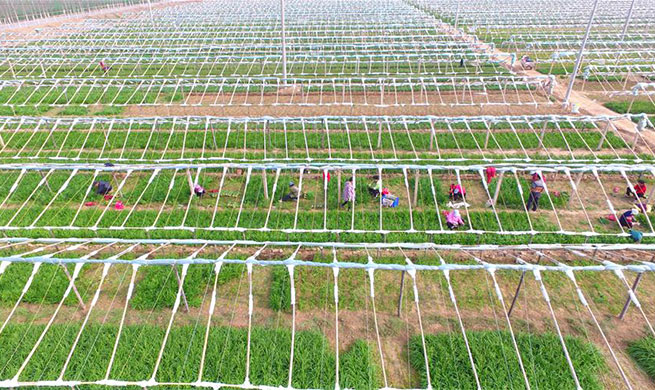by Tao Jun, Dong Hua
HO CHI MINH CITY, March 29 (Xinhua) -- Before sunrise in Vietnam's Ho Chi Minh City, a middle-aged man flicked on his flashlight and bathed a large truck full of pigs. With hose in hand he went on to douse the creatures and then the trunk in disinfectant.
Minutes after the truck registered in southern Dong Nai province left the Thu Duc Animal Quarantine Station in Ho Chi Minh City's Thu Duc District, another truck full of pigs from northern Hai Phong city arrived at the station.
The man, wearing a white vest, dark blue cap, and a blue facial mask, repeated his actions.
"Because African swine fever (ASF) is affecting more and more northern and central localities, we have to work around the clock to prevent it from hitting our city," the man, a veteran member of the quarantine station, told Xinhua recently.
"We check around 200 trucks carrying cattle and poultry every day. Specifically, we verify relevant documents, check the health status of the animals and disinfectant them," he said.
The station's deputy head, Le Cong Hieu, explained that the trucks were transporting pigs from other localities to slaughterhouses in the city and the officers in charge of animal health are present at slaughterhouses and wholesales markets around the clock to ensure that no sick cattle or poultry are slaughtered or sold.
Along with animal quarantine stations at entrances to Ho Chi Minh City, the city has three inter-sectoral checking teams, whose members include traffic police officers, food safety experts and volunteers. They frequently carry out road patrols to quickly detect animal-carrying vehicles which have dodged the quarantine stations.
Municipal authorities have instructed relevant sectors and all districts to map out urgent plans on preventing and combating ASF amid the rapid spread of the highly contagious disease in Vietnam's northern and central regions.
Accordingly, if ASF hits pig farms in the city, infected pigs and healthy pigs which have contact with infected ones must be culled, outbreaks isolated, and communes, wards or towns which have outbreaks disinfected daily for one week and three times a week for the two or three following weeks.
Ho Chi Minh City currently raises around 300,000 pigs, and consumes about 10,000 pigs daily, of which 80 percent are raised in other cities and provinces, including southern Dong Nai province, southern Ba Ria Vung Tau province and central Binh Thuan province, according to statistics from the municipal Department of Agriculture and Rural Development.
Among southern localities, the city consumes the largest amount of pork.
If a major ASF outbreak hits Ho Chi Minh City, leading to the shortage of pork, the city will turn to imported products and if local people turn their back on pork, the city will supply its markets with more chicken, the municipal Department of Industry and Trade said.
Similarly, the neighboring province of Dong Nai, which currently raises some 2.5 million pigs, the most among Vietnamese localities, is taking urgent measures to prevent ASF from entering its territory.
Dong Nai is establishing more animal checkpoints along routes leading to the province.
"Pig prices in the southern region are higher than those in the north, so large numbers of pigs are being transported from the north to the south, meaning ASF could spread to Dong Nai at anytime," a provincial Department of Agriculture and Rural Development official told Xinhua recently.
Fearing that ASF will strike Dong Nai soon, some farmers in the province have sold all of their pigs.
At present, pigsties on farms in Nguyen Hieu in Trang Bom district are empty. "I have just sold all 1,300 pigs. I will raise pigs again if ASF doesn't spread to Dong Nai or outbreaks in other provinces are eradicated," he said.
Other farmers are suffering from slumping prices of live pigs and falling sales of pork because some consumers have turned to chicken and fish.
"Now, traders buy our pigs for around 36,000 Vietnamese dong (1.6 U.S. dollars) per kilogram, down from 52,000 Vietnamese dong (2.3 U.S. dollars) three weeks ago," said Nguyen Van Quang, owner of a big farm in Thong Nhat district.
Vietnam's Department of Livestock Production has estimated that more than 2.5 million households in Vietnam are currently actively engaged in pig farming.
As such, the loss of pigs due to ASF infection and control measures has placed a heavy economic burden on many rural families, Albert Lieberg, the Food and Agriculture Organization of the United Nations (FAO) Representative in Vietnam, told reporters on March 19.
According to the FAO, although local authorities in Vietnam have been implementing measures to strictly control the movement of pigs and pig products from infected communes, and have been mobilizing their resources for pig culling and disposal, small pig farming models with low biosecurity that use swill feeding methods are continuing to facilitate the spread of ASF.
On Feb. 19, Vietnam announced the first ASF outbreaks in the two northern provinces of Thai Binh and Hung Yen.
As of March 27, the Department of Animal Health, under the auspices of the Vietnamese Ministry of Agriculture and Rural Development, confirmed a total of 476 ASF outbreaks in 23 cities and provinces. Some 73,000 pigs have been culled in an effort to curb further infections.
Farmers in Asia have a limited knowledge of ASF and the specific epidemiology of the hemorrhagic viral disease, as it has only recently been introduced to the region, according to the FAO.
But Chinese researchers have isolated an African swine fever virus, according to Chinese media earlier this week.
The research progress could contribute to more knowledge of the organism, and may also lead to new methods for prevention and control, the report said.













